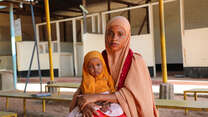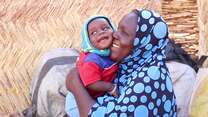When Amina Umaru Toko, 53, was displaced to Gwoza, Nigeria, due to violence and insecurity, she didn’t expect to also be suddenly caring for her critically ill grandchild.
Amina was entrusted with the responsibility of caring for then 19-month-old Abdullahi Ahmadu when his mother’s struggles with mental health issues rendered her unable to care for the child. She had been unable to breastfeed, and Abdullahi’s health was in critical condition when he was brought into Amina’s care — near death due to malnutrition.
“He was in such a bad condition, I thought he would not last the night. I was devastated; I could not sleep. At several intervals during the night, I would check on him, thinking he had passed away. But this boy was alive, fighting for his life,” Amina said about those first terrifying days caring for her grandchild. “When he survived the night, the next morning, I put him on my back, and that was when we went to the IRC.”
With funds from the European Union (EU), the IRC helped get Abdullahi to the hospital where he received critical malnutrition treatment that ultimately saved his life. After four days of essential support, Abdullahi was discharged and returned to his grandmother’s home healthier than before. He continued to receive malnutrition treatment through the IRC, who also provided the family with critical household and personal care items to take home for his continued well-being.
“I am thankful to the IRC. When I took my grandson to the hospital, they gave me some household items—a basin, a potty for the child, which we are currently using. They really helped me. IRC supported me. They gave me rice, plastic containers, soap, and detergent.”
Amina and Abdullahi’s situation is unfortunately not uncommon. Amina is an Internally Displaced Person (IDP) — someone forced to flee their home because of conflict, violence, persecution, or disaster inside their own country. Like many other IDPs in Gwoza, Amina was displaced after insecurity and violence at the hands of non-state armed groups forced her to leave her home in Borno State in the North-East of Nigeria. In the last decade, millions like Amina have been displaced in Nigeria due to the ongoing conflict, militant attacks, and the resulting instability.
Because of their situation, IDPs often face challenges like poor sanitation, disrupted food access, and loss of livelihood—all of which can contribute to acute malnutrition, the leading cause of child mortality and disease in crisis-affected regions.
It’s why the IRC, in collaboration with the EU, works in Nigeria and across West Africa to support families like Amina’s, combating these issues through comprehensive nutrition programs. IRC teams screen for severe malnutrition in children, make hospital referrals, and provide ready-to-use therapeutic foods and ongoing inpatient care for more complicated cases.
In addition to treatment, the IRC also emphasizes prevention through nutrition and hygiene training for caregivers and local health workers, as well as monitoring and follow-up care to track recovery and ensure long-term health.
It’s been more than a year since Amina and Abdullahi’s first encounter with the IRC, and Amina says that Abdullahi has made a full recovery and eats better than before.
"He is better now and eats better than before,” Amina said. "...I am very happy that he is now fully recovered.”
Amina’s story is a testament to the impact that the IRC has in providing life-saving support to those affected by displacement and malnutrition. Through its EU-funded programs in screening, treatment, and prevention, the IRC not only saved Abdullahi's life, but also empowered Amina with the resources and knowledge to care for her grandson. The shared EU and IRC's approach to addressing malnutrition ensures that families like Amina’s not only survive but also have a chance to rebuild their lives. Abdullahi’s recovery is a hopeful reminder of the resilience of caregivers and communities when given proper resources and care.
The International Rescue Committee partners with the European Union to provide life-saving support to people caught in conflict and disasters around the world. Our work funded by the EU enables people to survive, recover and rebuild their lives.




